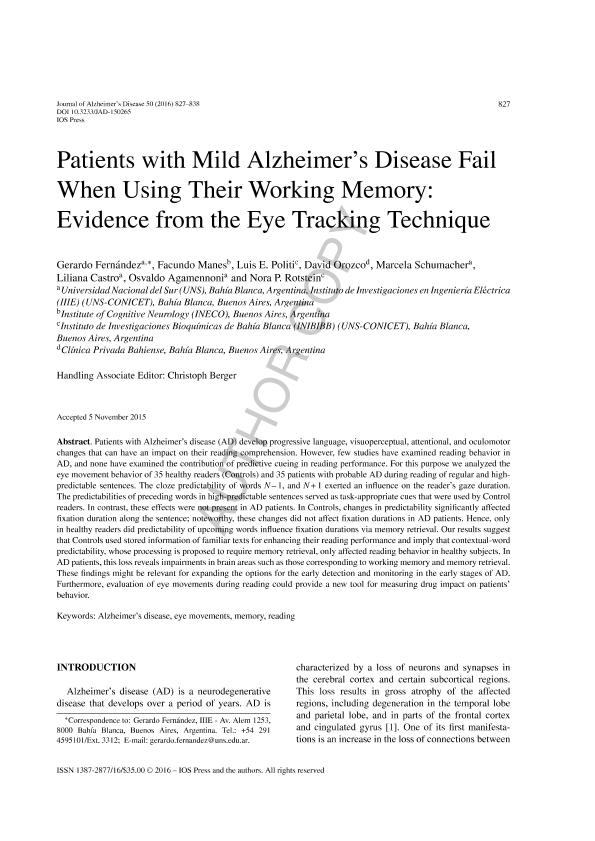Artículo
Patients with Mild Alzheimer’s Disease Fail When Using Their Working Memory: Evidence from the Eye Tracking Technique
Fernández, Gerardo Abel ; Manes, Facundo Francisco
; Manes, Facundo Francisco ; Politi, Luis Enrique
; Politi, Luis Enrique ; Orozco, David; Schumacher, Marcela Silvana
; Orozco, David; Schumacher, Marcela Silvana ; Castro, Liliana Raquel; Agamennoni, Osvaldo Enrique; Rotstein, Nora Patricia
; Castro, Liliana Raquel; Agamennoni, Osvaldo Enrique; Rotstein, Nora Patricia
 ; Manes, Facundo Francisco
; Manes, Facundo Francisco ; Politi, Luis Enrique
; Politi, Luis Enrique ; Orozco, David; Schumacher, Marcela Silvana
; Orozco, David; Schumacher, Marcela Silvana ; Castro, Liliana Raquel; Agamennoni, Osvaldo Enrique; Rotstein, Nora Patricia
; Castro, Liliana Raquel; Agamennoni, Osvaldo Enrique; Rotstein, Nora Patricia
Fecha de publicación:
02/2016
Editorial:
IOS Press
Revista:
Journal of Alzheimer's Disease
ISSN:
1387-2877
Idioma:
Inglés
Tipo de recurso:
Artículo publicado
Clasificación temática:
Resumen
Patients with Alzheimer's disease (AD) develop progressive language, visuoperceptual, attentional, and oculomotor changes that can have an impact on their reading comprehension. However, few studies have examined reading behavior in AD, and none have examined the contribution of predictive cueing in reading performance. For this purpose we analyzed the eye movement behavior of 35 healthy readers (Controls) and 35 patients with probable AD during reading of regular and highpredictable sentences. The cloze predictability of words N- 1, and N+ 1 exerted an influence on the reader's gaze duration. The predictabilities of preceding words in high-predictable sentences served as task-appropriate cues that were used by Control readers. In contrast, these effects were not present in AD patients. In Controls, changes in predictability significantly affected fixation duration along the sentence; noteworthy, these changes did not affect fixation durations in AD patients. Hence, only in healthy readers did predictability of upcoming words influence fixation durations via memory retrieval. Our results suggest that Controls used stored information of familiar texts for enhancing their reading performance and imply that contextual-word predictability, whose processing is proposed to require memory retrieval, only affected reading behavior in healthy subjects. In AD patients, this loss reveals impairments in brain areas such as those corresponding to working memory and memory retrieval. These findings might be relevant for expanding the options for the early detection and monitoring in the early stages of AD. Furthermore, evaluation of eye movements during reading could provide a new tool for measuring drug impact on patients' behavior.
Palabras clave:
Alzheimer'S Disease
,
Eye Movements
,
Memory
,
Reading
Archivos asociados
Licencia
Identificadores
Colecciones
Articulos(INIBIBB)
Articulos de INST.DE INVEST.BIOQUIMICAS BAHIA BLANCA (I)
Articulos de INST.DE INVEST.BIOQUIMICAS BAHIA BLANCA (I)
Articulos(SEDE CENTRAL)
Articulos de SEDE CENTRAL
Articulos de SEDE CENTRAL
Citación
Fernández, Gerardo Abel; Manes, Facundo Francisco; Politi, Luis Enrique; Orozco, David; Schumacher, Marcela Silvana; et al.; Patients with Mild Alzheimer’s Disease Fail When Using Their Working Memory: Evidence from the Eye Tracking Technique; IOS Press; Journal of Alzheimer's Disease; 50; 3; 2-2016; 827-838
Compartir
Altmétricas



